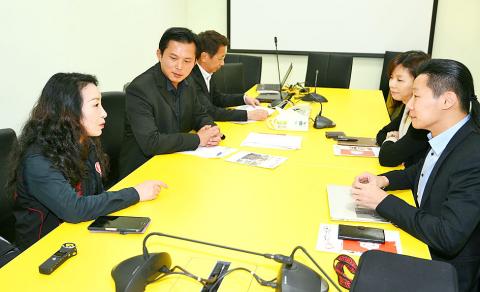The New Power Party (NPP) has yet to form a definitive stance on capital punishment, but is to make an announcement tomorrow after meeting with children’s rights advocates and experts, NPP Chairman Huang Kuo-chang (黃國昌) said yesterday.
“We will not promote a policy [on abolishing the death penalty] when society has yet to reach a consensus on the matter,” he said.
Huang met yesterday afternoon with Taiwan Children’s Rights Association director-general Wang Wei-chun (王薇君), who sought the party’s support in pushing for more legislation to protect children’s rights.

Photo: Chang Chia-ming, Taipei Times
The party has become a target of criticism following the grisly murder of a four-year-old girl on Monday morning in Taipei’s Neihu District (內湖) because of NPP Legislator Freddy Lim’s (林昶佐) support for the abolition of capital punishment.
The party said it had proposed policies on 14 different issues, not including eliminating capital punishment.
Lim said that discussions on whether the nation should abolish the death penalty at this time would only blur the focus, which should be to better protect the family of the murdered girl from further harm.
However, he reiterated that his ideal was that the nation would ultimately abolish capital punishment.
After his meeting with Wang, Huang said that all parties should work to protect the rights of children, because the issue covers several aspects.
“We should ask whether the government has enough resources to fund the mechanism through which similar crises can be reported,” Huang said.
“The standards and procedures we use to compel people with mental health issues to seek treatment must be reasonable and thoroughly enforced,” he said.
“People affected by abusive crimes should be protected by a dedicated agency,” he added. “The functions of correctional facilities should be enhanced.”
“All these are issues that need to be discussed calmly to prevent another tragedy,” Huang said.
Wang, who is an aunt of a child who died from physical abuse, said she hopes that all legislative caucuses could focus more attention on child safety issues.
She said the association has appealed to lawmakers for years to jointly work on the cause, but nothing has changed.
“It does not help much if we only condemn the perpetrator after what has happened,” Wang said.
“We hope that the number of cases involving abuse or murder of minors could be reduced to zero,” she said.
Wang said she supports the death penalty and hopes that the suspect in this case would receive the heaviest sentence, with a caveat that the nation must have a just judicial system in which no one is wrongfully convicted.
Commenting on Chinese Nationalist Party (KMT) Legislator Alicia Wang’s (王育敏) proposed amendment to the Criminal Code — automatic death penalty or life imprisonment for those who kill children aged less than 12 — she said it would not be much different from the law as it stands.
“The point is: How many of the proposed amendments to the Criminal Code would change what has already happened,” Wang Wei-chun said.
“Also, would supporters and opponents of the death penalty talk to each other and see what they can do to bring about judicial reform,” she added.

Taiwan has received more than US$70 million in royalties as of the end of last year from developing the F-16V jet as countries worldwide purchase or upgrade to this popular model, government and military officials said on Saturday. Taiwan funded the development of the F-16V jet and ended up the sole investor as other countries withdrew from the program. Now the F-16V is increasingly popular and countries must pay Taiwan a percentage in royalties when they purchase new F-16V aircraft or upgrade older F-16 models. The next five years are expected to be the peak for these royalties, with Taiwan potentially earning

STAY IN YOUR LANE: As the US and Israel attack Iran, the ministry has warned China not to overstep by including Taiwanese citizens in its evacuation orders The Ministry of Foreign Affairs (MOFA) yesterday rebuked a statement by China’s embassy in Israel that it would evacuate Taiwanese holders of Chinese travel documents from Israel amid the latter’s escalating conflict with Iran. Tensions have risen across the Middle East in the wake of US and Israeli airstrikes on Iran beginning Saturday. China subsequently issued an evacuation notice for its citizens. In a news release, the Chinese embassy in Israel said holders of “Taiwan compatriot permits (台胞證)” issued to Taiwanese nationals by Chinese authorities for travel to China — could register for evacuation to Egypt. In Taipei, the ministry yesterday said Taiwan

Taiwan is awaiting official notification from the US regarding the status of the Agreement on Reciprocal Trade (ART) after the US Supreme Court ruled US President Donald Trump's global tariffs unconstitutional. Speaking to reporters before a legislative hearing today, Premier Cho Jung-tai (卓榮泰) said that Taiwan's negotiation team remains focused on ensuring that the bilateral trade deal remains intact despite the legal challenge to Trump's tariff policy. "The US has pledged to notify its trade partners once the subsequent administrative and legal processes are finalized, and that certainly includes Taiwan," Cho said when asked about opposition parties’ doubts that the ART was

If China chose to invade Taiwan tomorrow, it would only have to sever three undersea fiber-optic cable clusters to cause a data blackout, Jason Hsu (許毓仁), a senior fellow at the Hudson Institute and former Chinese Nationalist Party (KMT) legislator, told a US security panel yesterday. In a Taiwan contingency, cable disruption would be one of the earliest preinvasion actions and the signal that escalation had begun, he said, adding that Taiwan’s current cable repair capabilities are insufficient. The US-China Economic and Security Review Commission (USCC) yesterday held a hearing on US-China Competition Under the Sea, with Hsu speaking on